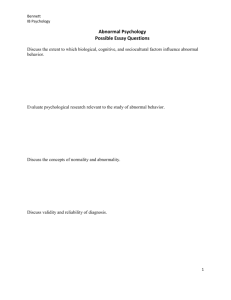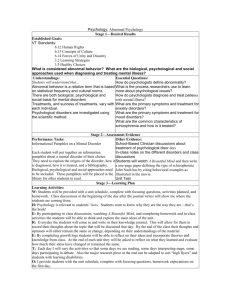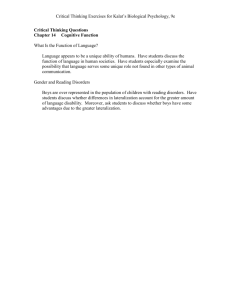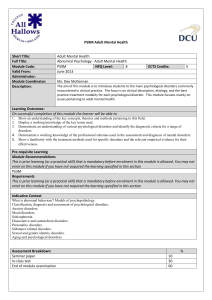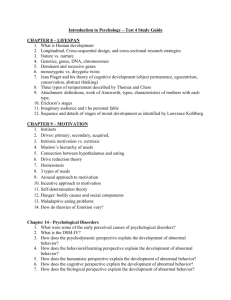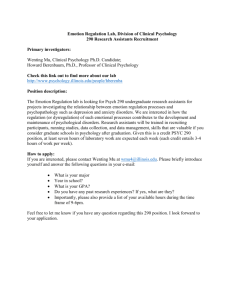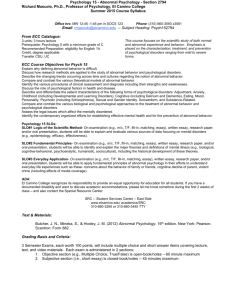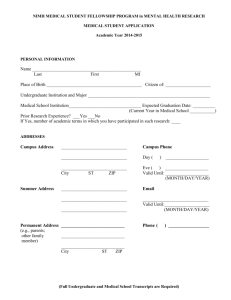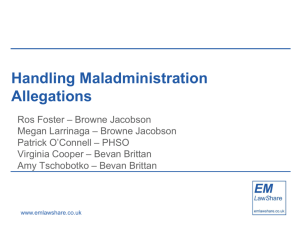DOC - Santa Clara University
advertisement
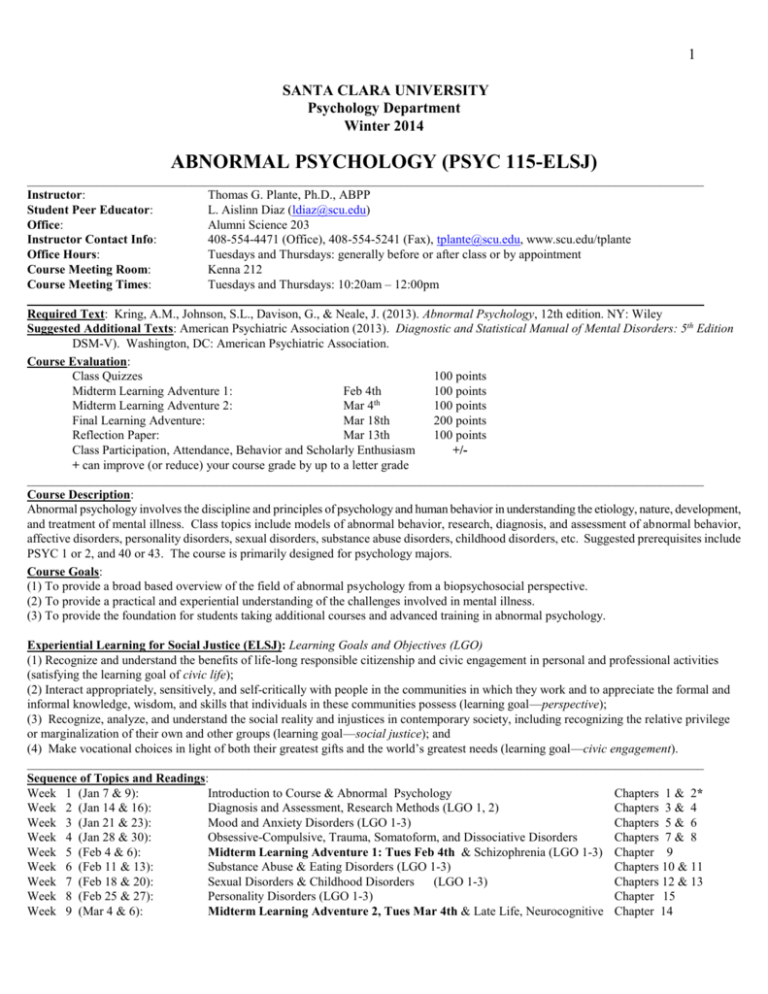
1 SANTA CLARA UNIVERSITY Psychology Department Winter 2014 ABNORMAL PSYCHOLOGY (PSYC 115-ELSJ) ___________________________________________________________________________________________________________ Instructor: Thomas G. Plante, Ph.D., ABPP Student Peer Educator: L. Aislinn Diaz (ldiaz@scu.edu) Office: Alumni Science 203 Instructor Contact Info: 408-554-4471 (Office), 408-554-5241 (Fax), tplante@scu.edu, www.scu.edu/tplante Office Hours: Tuesdays and Thursdays: generally before or after class or by appointment Course Meeting Room: Kenna 212 Course Meeting Times: Tuesdays and Thursdays: 10:20am – 12:00pm ___________________________________________________________________________________________________________ Required Text: Kring, A.M., Johnson, S.L., Davison, G., & Neale, J. (2013). Abnormal Psychology, 12th edition. NY: Wiley Suggested Additional Texts: American Psychiatric Association (2013). Diagnostic and Statistical Manual of Mental Disorders: 5th Edition DSM-V). Washington, DC: American Psychiatric Association. Course Evaluation: Class Quizzes 100 points Midterm Learning Adventure 1: Feb 4th 100 points Midterm Learning Adventure 2: Mar 4th 100 points Final Learning Adventure: Mar 18th 200 points Reflection Paper: Mar 13th 100 points Class Participation, Attendance, Behavior and Scholarly Enthusiasm +/+ can improve (or reduce) your course grade by up to a letter grade ___________________________________________________________________________________________________________ Course Description: Abnormal psychology involves the discipline and principles of psychology and human behavior in understanding the etiology, nature, development, and treatment of mental illness. Class topics include models of abnormal behavior, research, diagnosis, and assessment of abnormal behavior, affective disorders, personality disorders, sexual disorders, substance abuse disorders, childhood disorders, etc. Suggested prerequisites include PSYC 1 or 2, and 40 or 43. The course is primarily designed for psychology majors. Course Goals: (1) To provide a broad based overview of the field of abnormal psychology from a biopsychosocial perspective. (2) To provide a practical and experiential understanding of the challenges involved in mental illness. (3) To provide the foundation for students taking additional courses and advanced training in abnormal psychology. Experiential Learning for Social Justice (ELSJ): Learning Goals and Objectives (LGO) (1) Recognize and understand the benefits of life-long responsible citizenship and civic engagement in personal and professional activities (satisfying the learning goal of civic life); (2) Interact appropriately, sensitively, and self-critically with people in the communities in which they work and to appreciate the formal and informal knowledge, wisdom, and skills that individuals in these communities possess (learning goal—perspective); (3) Recognize, analyze, and understand the social reality and injustices in contemporary society, including recognizing the relative privilege or marginalization of their own and other groups (learning goal—social justice); and (4) Make vocational choices in light of both their greatest gifts and the world’s greatest needs (learning goal—civic engagement). ___________________________________________________________________________________________________________ Sequence of Topics and Readings: Week 1 (Jan 7 & 9): Introduction to Course & Abnormal Psychology Chapters 1 & 2* Week 2 (Jan 14 & 16): Diagnosis and Assessment, Research Methods (LGO 1, 2) Chapters 3 & 4 Week 3 (Jan 21 & 23): Mood and Anxiety Disorders (LGO 1-3) Chapters 5 & 6 Week 4 (Jan 28 & 30): Obsessive-Compulsive, Trauma, Somatoform, and Dissociative Disorders Chapters 7 & 8 Week 5 (Feb 4 & 6): Midterm Learning Adventure 1: Tues Feb 4th & Schizophrenia (LGO 1-3) Chapter 9 Week 6 (Feb 11 & 13): Substance Abuse & Eating Disorders (LGO 1-3) Chapters 10 & 11 Week 7 (Feb 18 & 20): Sexual Disorders & Childhood Disorders (LGO 1-3) Chapters 12 & 13 Week 8 (Feb 25 & 27): Personality Disorders (LGO 1-3) Chapter 15 Week 9 (Mar 4 & 6): Midterm Learning Adventure 2, Tues Mar 4th & Late Life, Neurocognitive Chapter 14 2 Week 10 (Mar 11 & 13): Legal & Ethical Issues, Career Issues, Future Trends, Conclusions (LGO 1-4) Reflection Paper Due: Thursday, Mar 13th 10:20am Chapter 16 Please have readings completed during the first class session of each week. Final Learning Adventure: Tues Mar 18th at 9:10am Additional Items: 1. Laptops and cell phones. Laptops and cell phones are not allowed to be used in class (unless you have a documented learning disability that requires the use of these technologies). Students typically use them more to check their email, Facebook, and surf the web more than they tend to use them for taking notes. They try to multitask (which doesn’t work according to the cognitive science research) and then wonder why they didn’t do well on class learning adventures or don’t recall what was said or not said in class. Research demonstrates that the grade performance for those using laptops tends to approximate the performance of those who don’t attend class. I think that says it all. Violations of this policy will result in being failed for the week (10 points, 1st offense), failed for the month (2nd offense, 50 points), failed for the course (3rd offense, all points). 2. Class Quizzes will occur weekly on the reading material. They will generally include 3 questions asked in class. You are expected to answer 2 of the 3 correctly to pass the quiz. Less than 2 correct answers will result in a fail for the week (10 points loss). Responses should be made on index cards and handed in to the professor. You should have 10 index cards available for the class. You cannot pass the quiz unless an appropriate index card is used. 3. Attendance. You’ll be asked to sign in for each class period and attendance will be recorded. You are expected to be in class for at least 80% of the class sessions. Less than 80% (without doctor or coaches written statement) results in failing the class attendance and behavior portion of the grade. 4. Expected classroom behavior. Please note the following expectations regarding classroom behavior: a. Arrive on time. b. Don’t pack up books and such before class is completed. c. Turn off cell phones. d. Use restrooms before and after class and during the mid-class break. e. Don’t leave class once started (if you do, please don’t return that day). f. If you miss class get notes from other students. g. Read the textbook as required. h. Participate in class discussions. i. Cheating in any form won’t be tolerated and will result in being failed from the class. 5. Make-up learning adventures are not possible. If you miss one of the learning adventures (note: an excused missed only. Unexcused missed adventures will result in a failing grade), the final learning adventure will count for 300 rather than 200 points (400 points if both midterms are missed). Missing the final will result in being failed from the course. According to university policy, the final exam schedule cannot be altered. If you plan to leave town etc. before the final you should not enroll in this class. Learning adventures will primarily be multiple choice and perhaps short essay and will be graded using a curve only if necessary. Learning adventures are meant to encourage critical thinking and will require that you stretch. They will hopefully challenge even the best students. 6. This class is approved as an ELSJ Core course. To meet the learning objectives of ELSJ, reflection on the placements will occur during part of each class. We’ll check in with you about your Arrupe placements and discuss how the experiences enliven and enrich the class topics being discussed that day. We will discuss how the Arrupe placement has illustrated the clinical psychology theories and practices for each class topic outlined in the sequence of topics listed above. For example, we will discuss how psychopathology (week 2) is often correlated with socioeconomic status, lack of social support, and lack of access to health services evidenced by Arrupe placement experiences. ELSJ Learning Objective 1 (recognize the benefits of life-long responsible citizenship) will be discussed in terms of the physical and mental health benefits of volunteerism and the social support that comes with finding a vocational path than serves others. This is especially highlighted during weeks 1, 9, and 10. ELSJ Learning Objective 2 (interact …with people in the community…) will be highlighted by discussing the relationships (including mentoring) that are developed in social service organizations. This is especially highlighted during weeks 2-4, 6-8. ELSJ Learning Objective 3 (recognize… social reality and injustices…) will be discussed by filtering the Arrupe placement experiences through the lens of Jesuit and other social justice teachings and perspectives. This is especially highlighted during weeks 2-6, 6-8. ELSJ Learning Objective 4 (vocational choices matching gifts with needs) will be highlighted as we discuss career directions and vocational paths in this field towards the end of the term during week 10. 3 7. The Arrupe Partnership Reaction Paper is a 3-5 page reaction paper to your experience with mentally ill persons and should incorporate one or more of the ELSJ learning objectives noted above. The papers should well integrate the learning you have experiences in both the class and the Arrupe placement in a thoughtful way. The paper is due at the beginning of the last class. Note that grades for late papers will reflect a ten points per day reduction. 8. We will review learning adventure answers immediately following each probe. They will provide you with an opportunity to learn how you did and provide you with your chance to ask questions about the adventures. 9. If you would like to speak with me individually, please feel free to do so. Please try to schedule your visit during scheduled office hours. If it is impossible for you to attend office hours due to a class conflict, then please make an appointment rather than an unscheduled visit. 10. Please be prompt to class. We will make every effort to begin and end each class on time. It is very disruptive to everyone and not appreciated when students come to class late or leave early. 11. If you would like to speak with me individually, please feel free to do so. Please make an appointment rather than an unscheduled visit if you can. Generally, before or after class works well. 12. In keeping with the mission of the university, relating the course material to the "greater glory of God and to the common good" as well as helping to educate leaders with competence, compassion, and conscience will be integrated into class material where appropriate. Integrated learning as an emphasis on critical thinking will also be highlighted. 13. In order to make the most of this course (and your tuition dollar) please attend each class session, keep up with the assigned reading, and participate in class activities and discussions with scholarly vigor. To help you further in this noble endeavor, the following list of "Top 10 Ways to do Well in Abnormal Psych" are offered for your consideration. Top 10 Ways to do Well in Abnormal Psych 10. 9. 8. 7. 6. 5. 4. 3. 2. 1. Remember, all papers must be written in APA style. Try to apply the material to your life and the lives of your loved ones. Make it come alive. Review the book chapters and your notes on a regular basis. Even 5 - 10 minutes each day to keep the material fresh is very helpful and minimizes stressful studying right before learning probes. Be a practicing clinical psychologist and take care of your mind and body. Don't cram or abuse caffeine (or other substances) and get enough sleep and food prior to learning probes. Don't even think of cheating (especially at a fine Jesuit university). Academic honesty and integrity is fundamental to our mission. Cheating (including plagiarism) will result in being dropped or failed from the course and will be referred to the university at large for disciplinary action. For each topic, concept, highlighted issue, etc. ask yourself the questions, "What's the bottom line? Why is this important? What's the big picture here? If I were the professor, why would I want students to know this?" Write organized, readable notes in class highlighting the major points and concepts. Consider rewriting your notes to help with reinforcing the material. Keep up with the readings. Mass learning (i.e., cramming) just doesn't work (remember the memory chapter in General Psych?). Reading and studying a little at a time works in the long run. Besides, you'll be way ahead of the game if you have done the assigned reading before class. Be an active learner. It pays off. Participate in class discussions, ask questions freely, engage in the process. There is no such thing as a "dumb question" if it is sincere. Attend class! Don't be tempted to skip class and just photocopy someone's notes. There is no substitute for being there. Ad Majorem Dei Gloriam DISABILITY ACCOMMODATION POLICY: To request academic accommodations for a disability, students must contact Disabilities Resources located on the second floor of Benson. Phone numbers are (408) 554-4111; TTY (408)554-5445. Students must register and provide documentation of a disability to Disabilities Resources prior to receiving academic accommodations.
